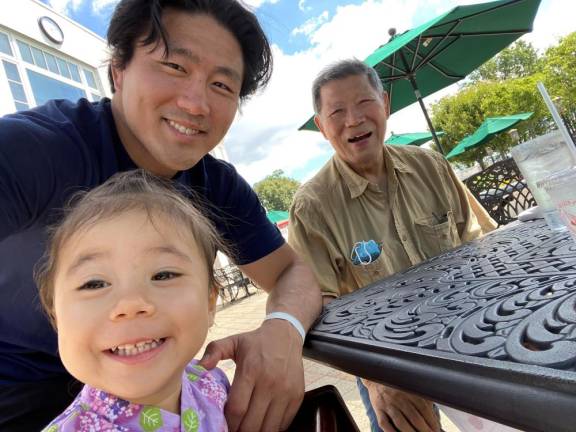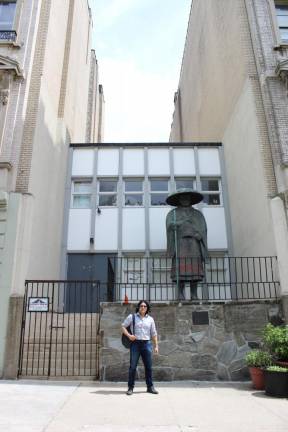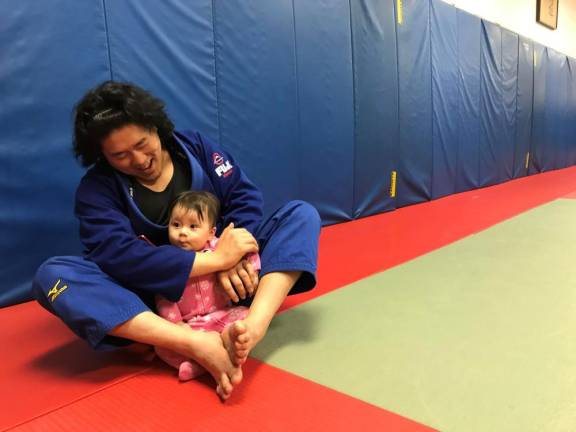The Businesses Left Behind
The martial arts studio Kokushi Budo has been an UWS institution for more than 50 years. Can it survive the pandemic?



Shintaro Higashi says his biggest fear after taking over his father’s martial arts dojo is “running it into the ground.”
“I would hate that narrative,” Higashi said of that horrifying, yet possible, outcome. The stakes would be high for anyone inheriting a family business, but in Higashi’s case, the dojo has also been a neighborhood institution for more than 50 years.
In 1963, his father, Nobuyoshi Higashi, heeded the call of Judo pioneers to move to New York as a part of an initiative to popularize and teach the art of Judo around the world. He left Japan with just $20 to his name and built a dojo in the basement of a Buddhist church located on Riverside Drive on the Upper West Side. In the decades that followed, the dojo, known as Kokushi Budo, became a community for thousands of New Yorkers.
As a child, Shintaro spent most of his afternoons after school at the dojo taking all of his father’s classes. He even became a Judo master in his own right as he won national championships and featured in two of U.S.’s world championship teams. When he took over the dojo, he was able to modernize the studio and update it into a business he and his family could live off.
And yet, thanks to the coronavirus pandemic, the dojo is in trouble.
Reluctantly, Higashi said he put aside his ego and launched a GoFundMe to pay for expenses, capital improvements needed to meet safety guidelines, as well as what’s owed in back rent at the dojo. The reaction from the Judo community was overwhelming: nearly $63,000 has been raised in just two weeks’ time. It’s a cash cushion Higashi said is needed desperately.
Bleak Picture
Many might be tempted tell of Higashi’s effort to save the dojo as a “feel-good” story. It does, after all, have the trappings of a heartwarming tale: A decades’ old Judo studio survives the financial fallout caused by a once-in-a-century pandemic thanks to the generosity of Internet strangers and longtime patrons from the community. But that’s the kind of framing that will get mercilessly mocked by a faction of social media users for putting an uplifting spin on stories that they say often reveal the failings of our society, and capitalism or the country’s health care system in particular. You see the ridicule following headlines about successful crowdfunded campaigns for a child’s medical treatment or a teacher’s classroom supplies. On the surface it’s heartening, but after a deeper look, it’s quite bleak.
Though the generosity Higashi has received says something about the goodness of humanity, it says a bit more about the country’s handling of the coronavirus pandemic. It’s now been seven months since COVID-19 began ravaging the U.S., and New York in particular, and Higashi still does not know when he’ll be able to open his doors again. Gyms have opened at limited capacities with rigid health guidelines, but boutique fitness studios, like Higashi’s dojo, have not been a part of reopening plans thus far. The threat of a second wave hitting the city puts a reopening even more in doubt.
“The small boutique gems like me have really been left out,” Higashi said in a recent interview. “I’m waiting for the government to say or [Mayor] de Blasio or [Gov.] Cuomo to be like, ‘OK, martial arts is okay. Thirty percent capacity, go ahead.’”
Higashi said he’s watched as the restaurant industry has taken center stage in reopening plans and wished more people in government were focused on small businesses like his, many of which are neighborhood institutions.
“I think you hear about the restaurant industry, but my industry has been one of the hardest hit. I’ve been closed for eight months now,” said Higashi. “There have been no concessions for martial arts or boutique fitness studios. I wish the city would do something about it.”
Lawsuit Against the Mayor
Higashi is certainly not alone in his sentiments. Last month, members of newly formed Boutique Fitness Alliance — which is comprised of about 100 of the city’s group fitness studios — and the New York Fitness Coalition, which represents 2,500 gyms and studios in New York, filed a lawsuit against the mayor. The suit takes issue with de Blasio’s decision to allow gyms to open while excluding group exercise studios. The mayor’s office, though, has designated indoor fitness classes to be a high-risk activity.
Higashi said he’s spoken to one elected official about his worries, Upper East Side Council Member Ben Kallos who is running for Manhattan Borough President in 2021. Kallos told the West Side Spirit that keeping institutions such as Kokushi Budo from closing should be a top priority for the city.
“Despite uncertainty about the future as it concerns the virus the City has a responsibility to come up with guidance and real tangible support so that small gyms like this one do not close for good and right now we have not done that yet,” said Kallos. “New Yorkers know the value of small businesses like this gym and they have shown that their tremendous generosity over the last two weeks raising ten of thousands so this neighborhood favorite opens up again once we beat this virus.”
The federal government’s Paycheck Protection Program was a big help in the beginning, Higashi said, but those funds only covered the expenses for two months. He’s also received another loan from the federal government, but he’s extremely hesitant to touch it.
“Little by little I’m chipping away at the cash cushion for the business. It’s dwindling away,” he said. And I’m right on the cusp of having to dip into that loan from the government, which I have to give back starting next year with interest. And how am I going to give back that loan if I don’t have any income? So my question is, how much longer can this business survive?”
If he is ever able to open again, Higashi said he will need to adapt to make sure the environment is safe for students.
“We’ll see what we can do that in this new landscape of normal,” he said. “I just want to open the doors back up for the people who need it, who need that kind of thing where people feel like they belong to a community, I think it’s huge for a lot of people.”
“Despite uncertainty about the future as it concerns the virus the City has a responsibility to come up with guidance and real tangible support so that small gyms like this one do not close for good and right now we have not done that yet.” Council Member Ben Kallos